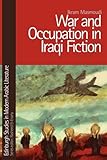War and Occupation in Iraqi Fiction / Ikram Masmoudi.
Material type: TextSeries: Edinburgh Studies in Modern Arabic Literature : ESMALPublisher: Edinburgh : Edinburgh University Press, [2022]Copyright date: ©2015Description: 1 online resource (248 p.)Content type:
TextSeries: Edinburgh Studies in Modern Arabic Literature : ESMALPublisher: Edinburgh : Edinburgh University Press, [2022]Copyright date: ©2015Description: 1 online resource (248 p.)Content type: - 9780748696550
- 9780748696567
- 892.7/37099567 23
- PJ8042 .M37 2015
- PJ8042 .M37 2015
- online - DeGruyter
- Issued also in print.
| Item type | Current library | Call number | URL | Status | Notes | Barcode | |
|---|---|---|---|---|---|---|---|
 eBook
eBook
|
Biblioteca "Angelicum" Pont. Univ. S.Tommaso d'Aquino Nuvola online | online - DeGruyter (Browse shelf(Opens below)) | Online access | Not for loan (Accesso limitato) | Accesso per gli utenti autorizzati / Access for authorized users | (dgr)9780748696567 |
restricted access online access with authorization star
http://purl.org/coar/access_right/c_16ec
Examines tangible experiences of war and occupation in recent Iraqi fictionThe last three decades in Iraqi history can be summarized in these words: dictatorship, war and occupation. After the fall of Saddam's regime Iraqi novelists are not only writing about the occupation and the current disintegration of Iraq but are also revisiting previous wars that devastated their lives. This book examines how recent Iraqi fiction about war depicts the Iraqi subject in its relation to war, coercion, subjugation and occupation. The theoretical medieval concept of the homo sacer, the killable, as defined by Giorgio Agamben is used to explore the lives and the experiences of different war actors such as the soldier, the war deserter, the camp detainee and the suicide bomber depicted in their "bare life" as men doomed to death in the necropolitical context.War and Occupation in Iraqi Fiction is an exploration of fictional works by a new generation of leading Iraqi authors such as Ali Badr, Shakir Nuri, Najm Wali, Hdiya Hussein and others. It brings to light the overarching continuum in the production of homines sacri in Iraq. Instances of homo sacer under the dictatorship are complemented by new instances found in the camp and under the state of exception of the occupation and the war on terror. Key FeaturesExplores fictional works by a new generation of leading Iraqi authors such as Ali Badr, Shakir Nuri, Najm Wali and Hdiya HusseinProvides a historical contextualization of the Iraqi novel before and after the fall of Saddam Hussein's regimePresents an analytical and critical study of a selected corpus of novels about war and occupation in IraqExplores tangible experiences of war and occupation - such as desertion, camp detention and suicide bombing - in the Iraqi novel
Issued also in print.
Mode of access: Internet via World Wide Web.
In English.
Description based on online resource; title from PDF title page (publisher's Web site, viewed 24. Mai 2022)


